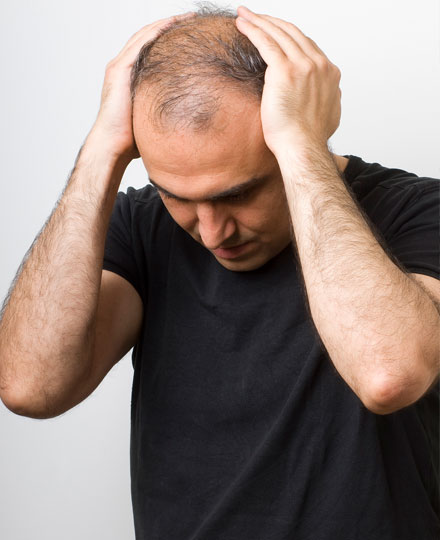
Hair Loss in Men
Hair loss is a pretty common problem amongst men all around the globe without any impact of race. A serious majority experiences this problem at some stage in life which can be as early as in the teens or as late as in 80's. It can damage the good looks of a person at any age and most people are unhappy with hair loss. While a good follicular hygiene and care for the hair in general is helpful in slowing down the process of hair loss, once it starts, stemming the flow is usually a losing cause. It is important to understand the causes of hair loss in men in order to be able to counter this problem. Let’s take a look closely at the causes and how they can be managed
Causes of hair loss
There are numerous causes of hair loss in men including hypothyroidism, plucking of hair, use of too many styling products and certain hairstyles that keep the hair very tight. Autoimmune diseases like Alopecia Areata too can cause hair loss on the scalp. However, the most common hair loss problem is known as androgenic alopecia, also referred to as male pattern baldness. It is a hereditary condition that is caused by the presence of a male hormone known as Dihydrotestosterone (DHT). Hydro testosterone is converted into DHT with the release of an enzyme known as 5 Alpha-Reductase. It is present not only in men but also in women in small quantities.
Are you a Candidate?
Whenever anyone wants to get a hair transplant, it is essential to know whether he is a candidate or not. It is necessary because everyone is not a good candidate for hair transplant. Following is a list contains the criteria of a good candidate for getting treatment for hair loss in men. You need to have hair supply on donor area that can be enough for current and future purpose.
Your hair loss is not continued.
Your scalp should not be too tight.
Your donor area has enough hair.
You are in good health.
How to Prepare for Hair Transplant? Initial prepare is necessary to get the best results from any hair transplant technique. Following are some steps for preparing for a hair transplant. Avoid smoking for at least 2-3 weeks before your treatment. Avoid intake of alcohol or any food that contains alcohol. Stop intake of herbal medication if you are taking any. Done with all prescribed tests before at least 7 days.
How to counter DHT?
DHT is a bit tough to counter once it starts affecting the strands. There are certain medications like Finasteride and topical solutions like Minoxidil that can counter this effects. However, in order to brings and maintain results, they need to be used consistently. They also have certain side effects that can be troubling in the longer run. Other options are the different variation of toupees that generally look fake and unsightly. They are best avoided to maintain a good appearance and other means of getting hair back on the scalp are ideal.
How effective are hair transplants?
Hair transplants are highly effective and once the hair grow back, they do not suffer further loss. The reason is quite simple. Hair for transplant are taken from the back and the sides of the scalp. Hair in this region are naturally resistant to the ill effects of DHT. Once the hair transplant process is completed and the hair have grown out to full length, a person can enjoy any kind of hairstyle he pleases without worrying about hair loss. Want to learn more about hair loss or hair transplants or to schedule a procedure, you’re always welcome at Dubai Hair Club. Or you can simply fill this form and get a free online consultation with our experts. As easy as that!
Post-Op Care and Recovery
After treatment, some essential information is provided to the patient so that he can get amazing results. The surgeons instructs him that how to take shower, how to do exercise, how to do rest, how to take care of new hair and treated scalp, etc. The physicians also suggest antibiotics and other painkillers to the patients. It takes about a week to heal your wounds and scabs require almost 15 days to diminish.About 8 weeks are required for shedding of hair in the start, and then new hair will start to grow within 4 months. Overall, 12 months are required for proper outcomes. However, the process of recovery will continue for 18 months.

 +97156 20 925 22
+97156 20 925 22 العربية
العربية 



